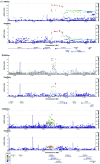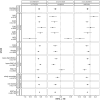Canadian COVID-19 host genetics cohort replicates known severity associations
- PMID: 38517939
- PMCID: PMC10990181
- DOI: 10.1371/journal.pgen.1011192
Canadian COVID-19 host genetics cohort replicates known severity associations
Erratum in
-
Correction: Canadian COVID-19 host genetics cohort replicates known severity associations.PLoS Genet. 2025 Mar 4;21(3):e1011628. doi: 10.1371/journal.pgen.1011628. eCollection 2025 Mar. PLoS Genet. 2025. PMID: 40036184 Free PMC article.
Abstract
The HostSeq initiative recruited 10,059 Canadians infected with SARS-CoV-2 between March 2020 and March 2023, obtained clinical information on their disease experience and whole genome sequenced (WGS) their DNA. We analyzed the WGS data for genetic contributors to severe COVID-19 (considering 3,499 hospitalized cases and 4,975 non-hospitalized after quality control). We investigated the evidence for replication of loci reported by the International Host Genetics Initiative (HGI); analyzed the X chromosome; conducted rare variant gene-based analysis and polygenic risk score testing. Population stratification was adjusted for using meta-analysis across ancestry groups. We replicated two loci identified by the HGI for COVID-19 severity: the LZTFL1/SLC6A20 locus on chromosome 3 and the FOXP4 locus on chromosome 6 (the latter with a variant significant at P < 5E-8). We found novel significant associations with MRAS and WDR89 in gene-based analyses, and constructed a polygenic risk score that explained 1.01% of the variance in severe COVID-19. This study provides independent evidence confirming the robustness of previously identified COVID-19 severity loci by the HGI and identifies novel genes for further investigation.
Copyright: © 2024 Garg et al. This is an open access article distributed under the terms of the Creative Commons Attribution License, which permits unrestricted use, distribution, and reproduction in any medium, provided the original author and source are credited.
Conflict of interest statement
The authors have declared that no competing interests exist.
Figures



Similar articles
-
Novel risk loci for COVID-19 hospitalization among admixed American populations.Elife. 2024 Oct 3;13:RP93666. doi: 10.7554/eLife.93666. Elife. 2024. PMID: 39361370 Free PMC article.
-
GWAS-Identified Loci are Associated with Obesity and Type 2 Diabetes Mellitus in Patients with Severe COVID-19.Front Biosci (Schol Ed). 2024 Aug 5;16(3):14. doi: 10.31083/j.fbs1603014. Front Biosci (Schol Ed). 2024. PMID: 39344392
-
Novel genes and sex differences in COVID-19 severity.Hum Mol Genet. 2022 Nov 10;31(22):3789-3806. doi: 10.1093/hmg/ddac132. Hum Mol Genet. 2022. PMID: 35708486 Free PMC article.
-
Genome-wide association studies of COVID-19: Connecting the dots.Infect Genet Evol. 2022 Dec;106:105379. doi: 10.1016/j.meegid.2022.105379. Epub 2022 Oct 21. Infect Genet Evol. 2022. PMID: 36280088 Free PMC article. Review.
-
Genetics Insight for COVID-19 Susceptibility and Severity: A Review.Front Immunol. 2021 Apr 1;12:622176. doi: 10.3389/fimmu.2021.622176. eCollection 2021. Front Immunol. 2021. PMID: 33868239 Free PMC article. Review.
Cited by
-
Age-dependent phenotypes of cognitive impairment as sequelae of SARS-CoV-2 infection.Front Aging Neurosci. 2025 Jan 7;16:1432357. doi: 10.3389/fnagi.2024.1432357. eCollection 2024. Front Aging Neurosci. 2025. PMID: 39839305 Free PMC article.
-
Correction: Canadian COVID-19 host genetics cohort replicates known severity associations.PLoS Genet. 2025 Mar 4;21(3):e1011628. doi: 10.1371/journal.pgen.1011628. eCollection 2025 Mar. PLoS Genet. 2025. PMID: 40036184 Free PMC article.
-
GWAS-significant loci and severe COVID-19: analysis of associations, link with thromboinflammation syndrome, gene-gene, and gene-environmental interactions.Front Genet. 2024 Aug 8;15:1434681. doi: 10.3389/fgene.2024.1434681. eCollection 2024. Front Genet. 2024. PMID: 39175753 Free PMC article.
References
Publication types
MeSH terms
Substances
Supplementary concepts
LinkOut - more resources
Full Text Sources
Medical
Miscellaneous

